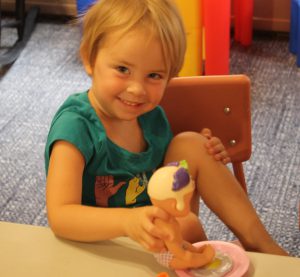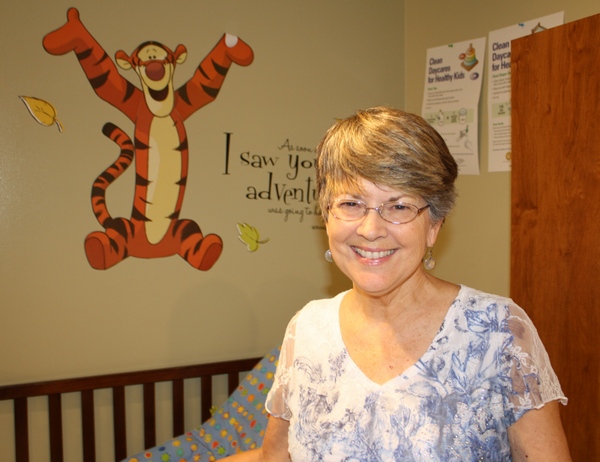Peace Place is buzzing with the energy of six industrious little children and one bright-eyed infant observing the action from an exersaucer. Three-year-old Nora sashays past in high heels, carrying three purses. “Are you going shopping for groceries, Nora?” I ask. “No!” she says sternly. “I’m going to buy a phone!” As Nora moves on, I see one little boy has climbed inside an empty toy trunk and is playing peek-a-boo with 22-month-old Beatrix. Another is trying to wrench my camera out of my hands; failing that, he settles for twisting the lens.
Peace Place looks like other day cares. The room is cheerful. There are bright rugs, tiny chairs, toys, and of course, the dress-up box from which Nora has selected her collection of handbags. Two details set Peace Place apart: each child receiving care has some kind of disability, and the care these children are receiving is free to their parents.
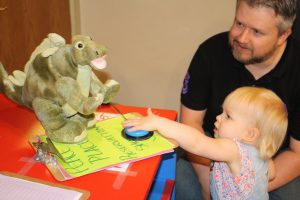 Two phone calls, one right after the other, were the catalyst for Peace Place. At the time, Director Elaine Hundley was the Children’s Education Director at the First Presbyterian Church in Great Falls. One program, “mothers’ morning out,” provided childcare so that mothers of young children could run errands or have a little break. One July day in 2011, a representative of Quality Life Concepts called to ask if the church program could provide respite care for a four-year-old with autism. Shortly after, another call came in asking whether an older woman with developmental disabilities could volunteer for the program. “I was sitting at my desk after that second call, and it was like a message had been received,” Hundley explains. “I was just given the vision for it, that we could do respite.” (Respite care is typically a short period of care provided to allow primary caregivers a little down time.)
Two phone calls, one right after the other, were the catalyst for Peace Place. At the time, Director Elaine Hundley was the Children’s Education Director at the First Presbyterian Church in Great Falls. One program, “mothers’ morning out,” provided childcare so that mothers of young children could run errands or have a little break. One July day in 2011, a representative of Quality Life Concepts called to ask if the church program could provide respite care for a four-year-old with autism. Shortly after, another call came in asking whether an older woman with developmental disabilities could volunteer for the program. “I was sitting at my desk after that second call, and it was like a message had been received,” Hundley explains. “I was just given the vision for it, that we could do respite.” (Respite care is typically a short period of care provided to allow primary caregivers a little down time.)
Hundley teamed up with Michelle Patterson, the mother of a child with disabilities who well understood the need for respite. It took little investigation to discover Great Falls, a city of over 59,000 people, had no program offering respite care for young children (0-3) with disabilities. Hundley and Patterson decided their vision would be respite care for children with disabilities age 0-5.
The underlying mission of Peace Place is to help families be the best families they can be by providing a break from the rigors of caring for a child with a disability 24/7. “The unrelenting stress causes all of us to fall apart,” Hundley says. “These are loving parents and they’re trying to do it all alone. And no one can do it all alone.”
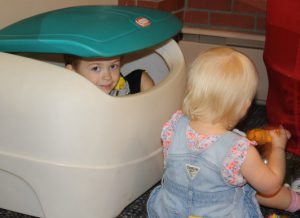 Hundley and Patterson wasted no time getting started, and Peace Place opened just eight months later in March 2012. Child care is provided on Sunday mornings, Mondays 8:30-2:30, and Wednesdays and Fridays 8:30-11:30. On the first Friday of the month, Peace Place also offers the opportunity for a date night for parents by providing care 5:00-8:00 pm. In the five years since opening, Peace Place has provided care for children with a variety of disabilities, 35 different diagnoses in all. “As different as the children are, including children of staff who come in, there’s just a nice mix of everyone being accepted, and having fun together, and doing what they can do,” Hundley shares.
Hundley and Patterson wasted no time getting started, and Peace Place opened just eight months later in March 2012. Child care is provided on Sunday mornings, Mondays 8:30-2:30, and Wednesdays and Fridays 8:30-11:30. On the first Friday of the month, Peace Place also offers the opportunity for a date night for parents by providing care 5:00-8:00 pm. In the five years since opening, Peace Place has provided care for children with a variety of disabilities, 35 different diagnoses in all. “As different as the children are, including children of staff who come in, there’s just a nice mix of everyone being accepted, and having fun together, and doing what they can do,” Hundley shares.
To encourage families to use Peace Place, Hundley has removed as many barriers as possible. Initially there was a charge for care, but she realized even minimal cost was a barrier. “Most of these families have already spent enormous amounts of money just getting medical care for their children,” Hundley says. “We know they’re inundated with paperwork and worries, so we try to relieve that and make it as simple as possible.” The paperwork is typical of any licensed day care with the exception of the Peace Place Child Information Form, which allows parents to share details about what calms and comforts their children, as well as what might trigger behavior.
Peace Place is a state-licensed Group Child Care Home. Staff receives 24 hours per year of training, much of it focused on autism and other commonly seen diagnoses. Peace Place has also partnered with the MSU College of Nursing to provide experience for nursing students as part of their pediatric rotation. Volunteers round out the Peace Place team ensuring a small child-adult ratio.
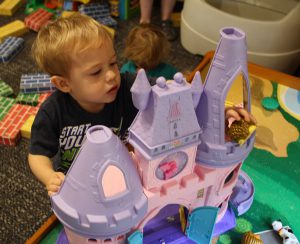 The impact Peace Place has had on those involved is a surprise to Hundley. “There’s been outgrowth I hadn’t expected,” she explains, mentioning a surgical nurse who went into pediatric nursing after volunteering at Peace Place, and a former Peace Place supervisor who decided to pursue a degree in nonprofit administration.
The impact Peace Place has had on those involved is a surprise to Hundley. “There’s been outgrowth I hadn’t expected,” she explains, mentioning a surgical nurse who went into pediatric nursing after volunteering at Peace Place, and a former Peace Place supervisor who decided to pursue a degree in nonprofit administration.
Supervisor Caitlin Prescott is proud of the impact Peace Place has had on her own son, who often accompanies his mother to work. “I’ve always worked with kids with disabilities,” she says. “I’m happy my son is accepting and loves these kids, and treats them like, no big deal.”
Dad Dexter Roberts is volunteering while on a break from school. His Beatrix started attending four months ago. In that brief time, Roberts has seen Beatrix’s communication and social skills grow. “She absolutely loves it here,” he says while watching the peek-a-boo game in the trunk. “I did have reservations, but they went away pretty quick.”
Hundley says many parents are reluctant to leave their children with disabilities in a childcare situation. One mother explained in a note, “Guilt kept me away.” Hundley acknowledges it is a big step, but it can be a life-changing one. “We’re here to provide care for families so they can be healthy and happy,” Hundley says. “Peace Place is my north star. I feel like I’m doing what I was created to do.”
